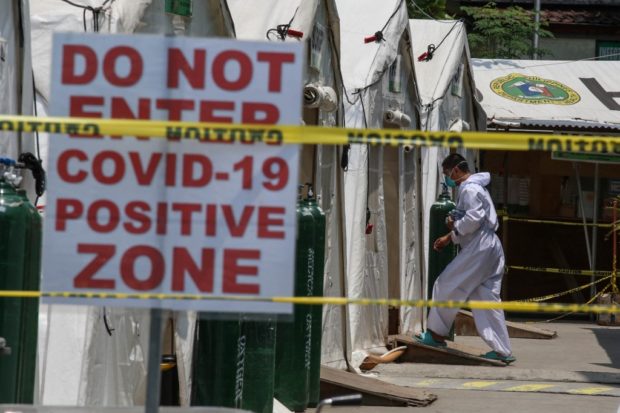
This photo taken on April 6, 2021 shows a man wearing personal protective equipment walking into a makeshift ward built for COVID-19 patients at a hospital in Manila. (Photo by JAM STA ROSA / AFP)
MANILA, Philippines — Faced with the imminent threat from the more infectious Delta variant of COVID-19, the business community is supporting calls for a two-week hard lockdown in August to quickly stop the spread of the virus.
Late on Wednesday, the Palace did announce a two-week general community quarantine (GCG) “with heightened restrictions” in Metro Manila and a few other places.
READ: Metro Manila mayors want 2-week NCR lockdown, inoculations without classifications
Last Tuesday, Joey Concepcion, presidential adviser for entrepreneurship, said that micro, small- and medium-sized enterprises (MSMEs) were open to a lockdown next month instead of risking a longer one later this year if people’s mobility would not be restricted and eventually cause a surge in COVID-19 cases.
He said an early lockdown would help ensure that businesses would have the opportunity to recover their losses during the seasonal Christmas boom of the fourth quarter.
“And this [coming] last quarter will be special in that the Christmas season will be combined with election spending, which will start definitely by that time,” Concepcion said.
Leaders of the Philippine Chamber of Commerce and Industry (PCCI) and the Federation of Filipino Chinese Chambers of Commerce and Industry Inc. (FFCCCII) also backed the recommendation of the independent Octa Research Group for a lockdown to prevent the spread of the Delta variant.
“We are in total agreement that if we are going to do a hard lockdown, let’s not wait,” Concepcion said at the Pandesal Forum held online and hosted at the Kamuning Bakery and Cafe in Quezon City.
“Let’s make it while we can and, according to Octa, the chances of success of a shorter lockdown will be much greater than if we do it much later on,” said Concepcion, who is founder of the nonprofit GoNegosyo advocacy group.
More devastating
He warned that if the country waited as the virus continued to spread, the number of infections would be bigger and a more devastating lockdown would be needed later.
PCCI president emeritus George Barcelon said that the country’s biggest business group was agreeable to a lockdown in August, but not earlier than the second week.
“It’s important that there is time for the business sector to make preparations,” Barcelon said.
FFCCCII president Henry Lim Bon Liong said he also preferred a two-week lockdown to a longer one.
President Duterte’s chief economic manager has likewise conceded to a possible return to a more stringent lockdown.
“Sometime last year, I made the observation that this contagion would most likely not disappear quickly and that sometimes we may have to take a step backward after taking two [steps] forward, to protect our gains achieved in combating the virus. I believe the new variant has forced us to do exactly that,” Finance Secretary Carlos Dominguez III said.
Options
The Philippine College of Physicians also added to calls for tighter movement restrictions as Metro Manila hospitals started to feel the noose tightening on them again with the increasing number of new COVID-19 cases.
Octa Research suggested three options to address the spread of the Delta variant, which has wreaked havoc in India and now also in Indonesia, Malaysia and Vietnam.
One was to implement a lockdown starting Aug. 1 to regain effective control of COVID-19. That soon, such control might be attained in two weeks or even just a week.
The second was to start a hard lockdown on Aug. 16, but this might result in more than 2,500 new cases of COVID-19 daily until the end of August. Octa Research said this would likely require a longer lockdown period.
It said that if a hard lockdown would start on Aug. 8, regaining effective control would need two to three weeks of such lockdown.
DOH: What surge?
Despite Octa’s warning, the Department of Health (DOH) said there was no “definitive evidence” of a surge fueled by the more transmissible Delta variant.
In a statement, the DOH also cautioned independent experts against making pronouncements that could cause fear and panic.
The DOH did not name Octa in its statement, but the health department made the pronouncement following the research group’s call for a two-week lockdown to stop what it called “the beginning of a surge” in the National Capital Region (NCR).
In a television interview on CNN Philippines, Octa Research fellow Guido David said the group was very careful with its pronouncements and that a surge in NCR was “unmistakable.”
But in its statement, the DOH said based on its metrics such as health care utilization rate and emergency room admission, the country was still at low risk.
The DOH Regional Epidemiology and Surveillance Unit in Metro Manila on Wednesday also said there was no surge yet of COVID-19 cases in the metropolis.
On Wednesday, the DOH said it recorded 4,478 new COVID-19 cases in the country, bringing the total case count up to 1,566,667.
The lower than usual number was due to “late case extraction” on Monday, the DOH said. The DOH usually gets data of new cases at around 1 p.m., but on Monday the figures were received at 9 p.m., resulting in a high case count on Tuesday and a lower count on Wednesday.
However, despite the low new case count, the country recorded its highest positivity rate in nearly three months.
Of the 34,199 tests conducted on Monday, 15 percent or 5,129 individuals tested positive for the virus. According to World Health Organization criteria, a positivity rate of less than 5 percent indicated that virus spread was under control.